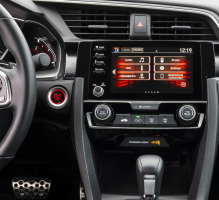
— If your Honda Civic AC is not working, two lawsuits have been consolidated into one class action lawsuit related to 2016-2020 Honda Civic (2- and 4-Door), 2017-2021 Honda Civic (Hatchback) and 2017-2021 Civic Type R cars.
Eleven Honda Civic owners filed the lawsuit alleging their air conditioners stopped working due to cracks and leaks of refrigerant which caused a loss of pressure within the AC systems.
The consolidated Civic AC class action includes plaintiffs in two related actions: Wong v. American Honda, and Munoz v. American Honda.
A separate case, Elkins v. American Honda, had already been dismissed by the same judge now hearing the consolidated class action lawsuit.
The new class action includes these 11 plaintiffs who allege their Honda Civic AC systems stopped working.
- Andre Wong / California / 2016 Honda Civic
- Amado Munoz / California / 2017 Honda Civic
- Frank Costobile / Pennsylvania / 2016 Honda Civic
- Rachel Fairchild / Florida / 2016 Honda Civic
- Carolyn Heier / Virginia / 2016 Honda Civic
- Ben Hu / California / 2016 Honda Civic
- Matthew Robinson / Florida / 2016 Honda Civic LX
- Michael Schwartz / Oregon / 2017 Honda Civic
- Gary Tetrault / Connecticut / 2016 Honda Civic
- James Tillery / Virginia / 2016 Honda Civic
- Lingyang Yin / Washington / 2016 Honda Civic
The Honda Civic customers who allege their AC stopped working claim Honda knows about the problems but won't recall the cars to fix them properly.
The class action also alleges the Civics use R-1234yf refrigerant which is supposed to be more friendly to the environment than R-134a refrigerant. However, the Honda class action alleges the AC stops working because the system can't handle the R-1234yf refrigerant, causing the AC to stop working to cool the Civic cabin.
Leaks in the condensers or compressors cause AC problems, but the plaintiffs claim failures can also occur to the evaporators and discharge and suction lines.
Additionally, the lawsuit alleges dealers often claim the AC stopped working because of impacts with road debris, and sometimes dealers allegedly tell Civic owners no leaks can be found.
Honda Civic AC Failures Under Warranty
If a Honda Civic owner visits a dealership to repair the AC that stopped working, those owners are allegedly charged diagnostic fees even when the cars are covered by warranties.
Honda Civic owners allegedly pay $150 to $2,000 to repair the AC systems when they stop working, and the repairs are also allegedly useless because Honda uses the same defective parts as replacements.
"Regardless of whether Honda provides warranty coverage for one failed component or claims it has permanently repaired the AC System, its repair efforts typically prove ineffective: other AC System components invariably fail outside the warranty period, forcing Class members into a never-ending and expensive game of whack-a-mole involving a vehicle for which they have already paid tens of thousands of dollars." — Honda Civic AC class action lawsuit
Replacement air conditioning parts are allegedly on backorder because so many Civic cooling systems have defects that cause the systems to fail. Civic owners are allegedly faced with either going without the AC or purchasing aftermarket components at their own expense.
Then Honda’s warranties allegedly claim the use of aftermarket parts to repair the AC systems will preclude Honda Civic customers from participating in any recall campaigns.
According to the consolidated class action lawsuit:
"Honda did not disclose any of the Defect’s potential failure modes to prospective customers until three months after the filing of the original complaint in Elkins v. Honda when it issued TSB 19-091, extending the warranty on the AC condenser only to 10 years from the original date of purchase on Model Year 2016-2018 Honda Civic vehicles." — Honda Civic AC class action
The TSB (technical service bulletin) says, “[t]he A/C condenser was not manufactured to specification. As a result, tiny holes may develop in the condenser tube walls that allows the refrigerant to leak out.”
The plaintiffs claim Honda used the TSB as the main reason the Elkins case should be dismissed, and it was dismissed. But the current lawsuit alleges the extended warranty and free repairs offered by Honda didn't include all the affected vehicles.
"Honda also concealed that the problem was not limited to the AC condenser as it had represented in TSB 19-091 and to this Court, but rather, that AC compressors had been failing in record numbers as well. Honda was aware of this at least prior to December 20, 2019, when it first informed its American dealerships it had become aware of 'an unprecedented demand for A/C compressors which, at times has created a backorder situation.'” — Honda Civic AC lawsuit
Honda later issued TSB 21-014 to include more vehicles, but the lawsuit alleges the bulletin fails to properly address the AC problems.
The Honda Civic AC lawsuit was filed in the U.S. District Court for the Central District of California: Wong, et al., v. American Honda Motor Co., Inc., et al.
The plaintiffs are represented by McCune Wright Arevalo LLP, Milberg Coleman Bryson Phillips Grossman PLLC, Bradley/Grombacher LLP, Cafferty Clobes Meriwether & Sprengel LLP, and Berger Montague PC.




